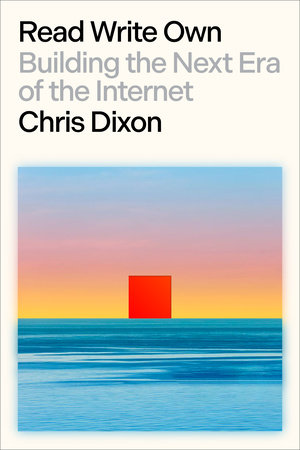Chris Dixon’s “Read Write Own” didn’t necessarily help me understand the technical aspects of blockchain (my fault, not his), it did give me better context on internet networks (protocol, corporate, blockchain). It also gave me a deeper understanding how decentralized networks work, and the role they can play in building a better internet.
Dixon, head of a16z’s crypto investing, is understandably bullish on a decentralized approach to the internet. While he may have a financial interest in its success and “Read Write Own” could come off as hype, Dixon outlines the philosophical aspects of each network type – and why blockchain is superior – in a way that shows he thinking just as intellectually as he is financially.
“Read Write Own” is an important read for government leaders and technology vendors, especially policymakers and IT executives, whose budget influence has an important impact on the healthy evolution of the internet.
Whether blockchain and decentralized networks are hype or the future, at least Dixon takes a deep philosophical stance and puts his money where his mouth is.
Excerpts
The opportunity ahead is to build the great networks of the future: the economic, social, and cultural substrate of the digital world. Networks are the internet’s killer app. While protocol networks democratize access to information, their weaknesses limit their viability for the future. Corporate networks improve and extend the internet’s capabilities, but they stifle growth in pursuit of controlled, theme-park-like experiences.
Blockchain networks are like cities, built from the bottom up by the people who inhabit them. Entrepreneurs build businesses, creators cultivate audiences, and users have meaningful choices, rights, and agency. Networks operate transparently, governed by communities. People who contribute are rewarded financially. It’s an internet built by everybody, for everybody.
The promise of the read-write-own era of the internet is to maintain a healthy civic life in the digital world. Civic life thrives through a balance of private and community ownership. The public sidewalk allows passersby to discover new restaurants, bookstores, and shops. A homeowner spends weekends remodeling, in turn improving a neighborhood. A world without both private and community ownership is a world that stifles creativity and human flourishing.
From the publisher
The internet of today is a far cry from its early promise of a decentralized, democratic network of innovation, connection, and freedom. In the past decade, it has fallen almost entirely under the control of a very small group of companies like Apple, Google, and Facebook. In Read Write Own, tech visionary Chris Dixon argues that the dream of an open network for fostering creativity and entrepreneurship doesn’t have to die and can, in fact, be saved with blockchain networks. He separates this movement, which aims to provide a solid foundation for everything from social networks to artificial intelligence to virtual worlds, from cryptocurrency speculation—a distinction he calls “the computer vs. the casino.”
With lucid and compelling prose—drawing from a twenty-five-year career in the software industry—Dixon shows how the internet has undergone three distinct eras, bringing us to the critical moment we’re in today. The first was the “read” era, in which early networks democratized information. In the “read-write” era, corporate networks democratized publishing. We are now in the midst of the “read-write-own” era, sometimes called web3, in which blockchain networks are granting power and economic benefits to communities of users, not just corporations.
Read Write Own is a must-read for anyone—internet users, business leaders, creators, entrepreneurs—who wants to understand where we’ve been and where we’re going. It provides a vision for a better internet and a playbook to navigate and build the future.
Praise
Kevin Kelly, bestselling author of The Inevitable:
“This book changed my mind. It’s a clear manifesto for redeeming the internet, and making it the democratic platform we all want. It’s the best positive case for crypto I’ve seen.”
Sam Altman, co-founder, OpenAI:
“Read this book to understand a compelling vision of where the internet should go and how to get there.”
Mark Cuban, Shark Tank; Dallas Mavericks:
“Chris takes on the challenge and succeeds at explaining just how crypto technology is what’s important to our technological future and how we all can benefit, much like we have from the internet. I would encourage all regulators and crypto nay-sayers around the world to read this book.”
Nicholas Thompson, CEO, The Atlantic; former editor-in-chief of Wired:
“I love this book: the history, the insights, the optimism. Dixon does a brilliant job of explaining where the internet went wrong, but does an even better job explaining how to make things right. Every page has important arguments about how blockchains can make technology more democratic, just, and trustworthy.”
